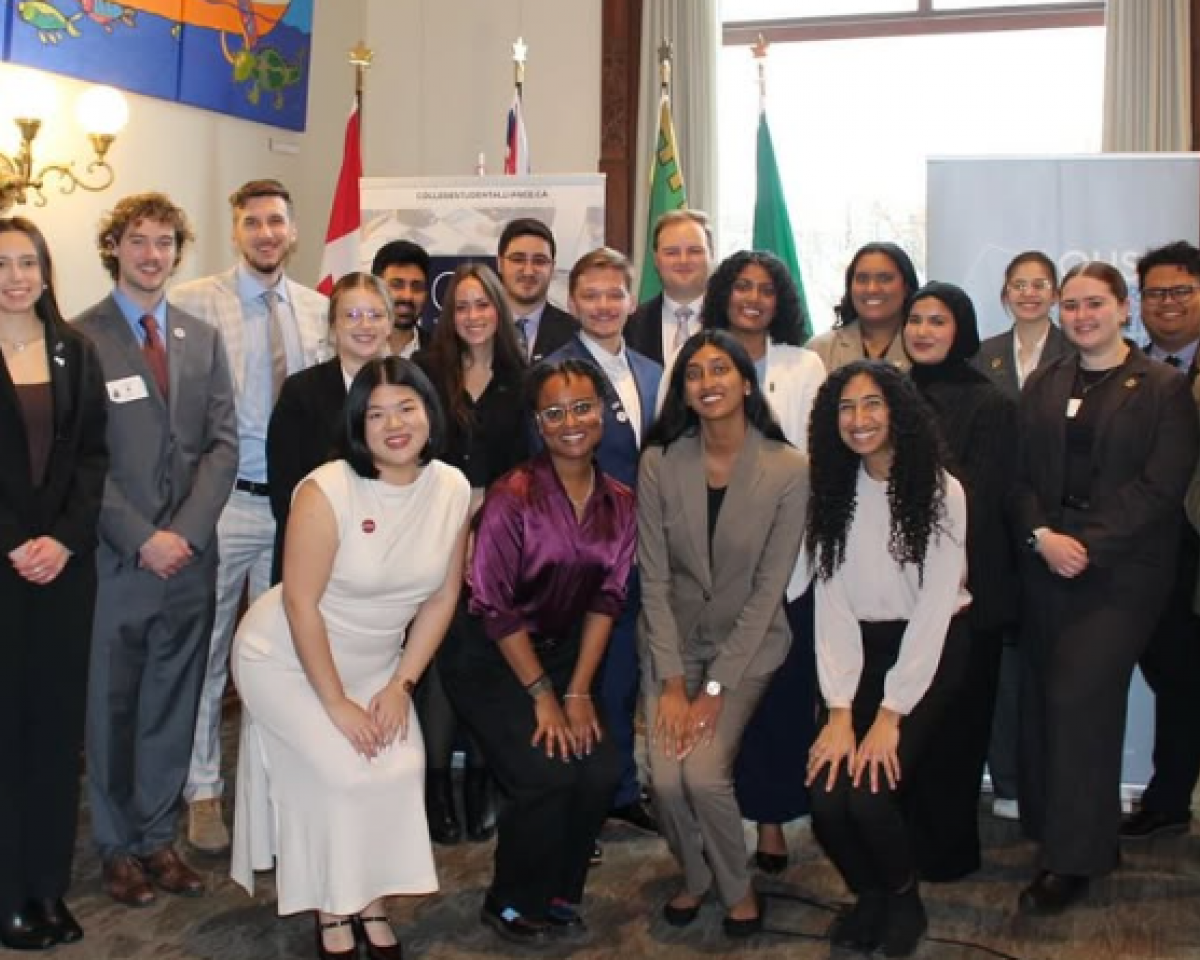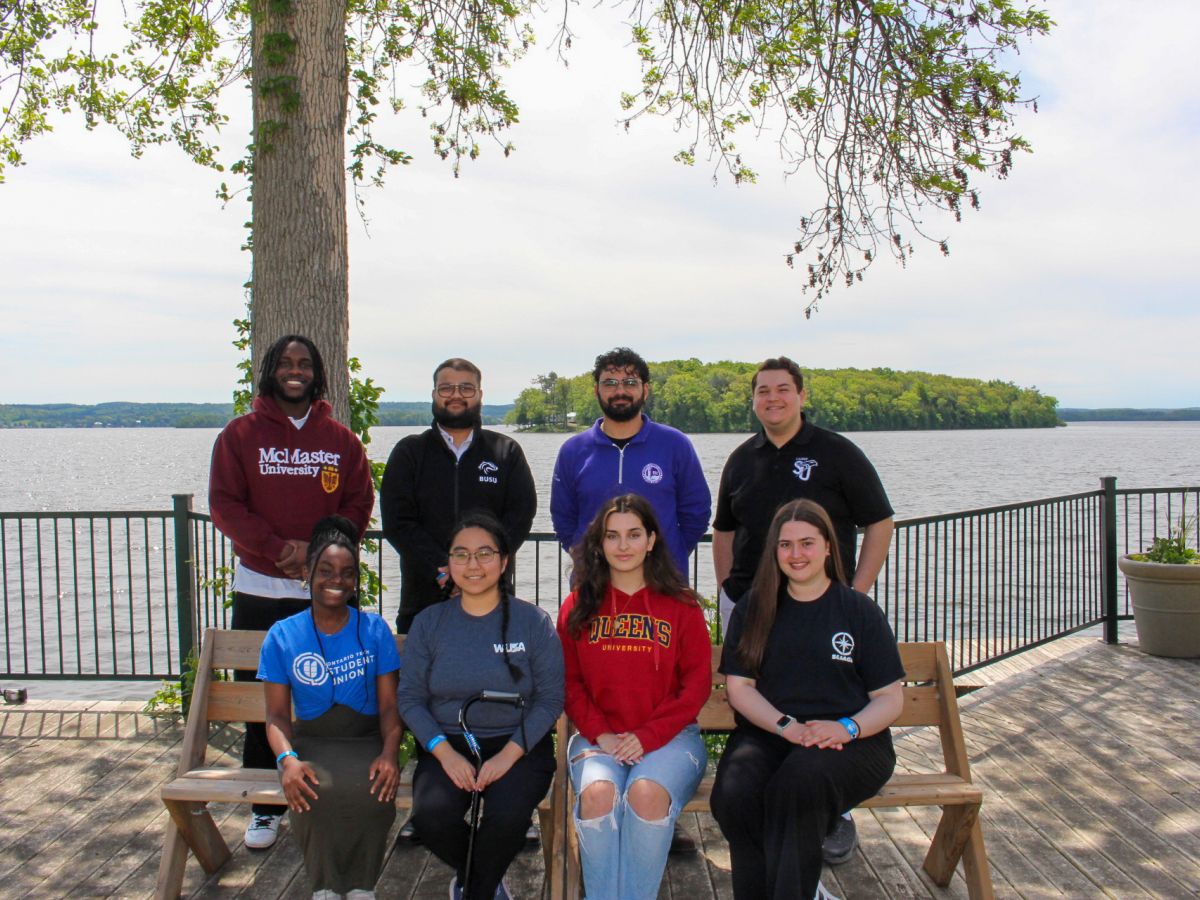Government Affairs
The Government Affairs portfolio represents Queen’s undergraduate students at the municipal, provincial, and federal levels. This branch of the Commission of External Affairs (CEA) works to ensure that student priorities are reflected in public policy and community decision-making.
Whether it’s pushing for affordable housing, protecting financial aid, or advocating for accessible transit, the Government Affairs team engages directly with elected officials, advocacy networks, and campus stakeholders to drive student-centered change. We aim to amplify student voices and empower students to understand—and shape—the systems that impact their lives.

Municipal Advocacy

The AMS Government Affairs team works closely with the City of Kingston to ensure student voices are represented in decisions that impact life off-campus. From housing regulations and bylaw enforcement to transit access, community relations, and harm reduction, our municipal advocacy focuses on improving the everyday experience of Queen’s students living in Kingston.
We aim to foster a more informed, respectful, and student-inclusive relationship between the City and the student population through regular consultation, policy feedback, and on-the-ground outreach.
Key areas of work include:
We maintain ongoing relationships with councillors, City staff, and key municipal leaders (such as the district associations) to ensure students are part of long-term planning conversations and not just consulted reactively.
We attend City Council when needed and advisory committees to raise student perspectives on housing, transit, community safety, and affordability. These delegations allow us to influence municipal decision-making directly.
We collaborate with City staff to improve housing conditions in the student district through proactive inspections, education, and reporting mechanisms.
The CEA and VPUA sits on this formal working group alongside representatives from the City, Queen’s administration, the SGPS, and Kingston Police. It facilitates ongoing communication and joint problem-solving around shared issues like housing density, party enforcement, and student wellbeing.
A community-building initiative that encourages students to connect with local residents, understand their civic responsibilities, and contribute positively to the neighbourhoods they live in.
Through workshops, guides, and peer-to-peer outreach, we help students understand Kingston’s bylaws—from property standards and snow removal to noise rules and parking—so they can be informed tenants and neighbours.
Provincial Advocacy
At the provincial level, the AMS advocates for undergraduate students through its membership in the Ontario Undergraduate Student Alliance (OUSA)—a coalition of student associations working to improve post-secondary education across Ontario. As a voting member, the AMS helps shape provincial policy by contributing to OUSA’s advocacy priorities, submitting budget recommendations to the Ministry of Colleges and Universities, and participating in research and consultation.
Our provincial advocacy is both policy-driven and student-led. Each year, we collect feedback from Queen’s students to inform OUSA’s policy papers and recommendations, ensuring that real student needs drive the agenda.
Our advocacy takes shape through:

The AMS Commissioner of External Affairs sits on OUSA’s Steering Committee (essentially board of directors), where they represent Queen’s students and help guide the organization’s strategy, priorities, and campaigns. This body meets regularly with policymakers and post-secondary stakeholders throughout the year.
Each fall and winter, the AMS sends a student delegation to OUSA’s GA, where students debate and vote on official policy papers. GA is an opportunity for students to directly shape the solutions OUSA puts forward to the provincial government.
Through booths, surveys, focus groups, and classroom talks, we gather feedback on key provincial issues—like OSAP, housing, and mental health—to ensure Queen’s perspectives are reflected in OUSA’s work.
We regularly meet with MPPs, political staff, and ministry officials to discuss how provincial decisions affect students and to push for solutions that reflect lived student experience.
Each year, the AMS works with OUSA to identify key issues facing students and propose meaningful policy solutions to the provincial government. These priorities are shaped by student feedback, campus trends, and provincial context—ensuring that Queen’s students have a voice in the conversations that matter most.
For the 2025–26 year, our advocacy focuses on three core areas:
Student and Community Safety
We’re calling on the provincial government to require all licensed establishments to implement comprehensive sexual violence policies that cover staff-staff, staff-patron, and patron-patron interactions.
We also advocate for increased provincial support to municipal property standards departments—through funding, training, and inspection capacity-building programs like RentSafeTO.
Strengthening Ontario’s Workforce
We support revitalizing the Career Ready Fund to expand work-integrated learning in underrepresented disciplines. Additionally, we are pushing for a reform of the Co-operative Education Tax Credit, so employers can claim up to 30% of the current average co-op salary—encouraging more placements for students.
Meeting Post-Secondary Demand
To address housing pressures, we urge the province to work with municipalities on a housing action plan that increases both market and non-market housing supply in student-dense areas. We are also advocating for reforms to cyclical corridor funding negotiations, allowing institutions in Southern Ontario to adjust for projected enrolment growth and providing Northern schools more flexibility to meet sustainability goals.
Federal Advocacy
At the federal level, the AMS advocates on large-scale policy issues that shape the national post-secondary landscape. Our work focuses on ensuring students are included in decisions about housing, immigration, financial aid, and research—especially as the cost of education and living continues to rise.
We participate in federal advocacy through our membership in the Undergraduate Canadian Research-Intensive Universities (UCRU) coalition, a national group representing students from U15 research-intensive institutions. UCRU advocates directly to Members of Parliament, ministers, and federal departments through lobby weeks, policy briefs, and stakeholder consultations.
In 2025–26, we’re also participating as an observer with the Canadian Alliance of Student Associations (CASA)—Canada’s largest student advocacy organization. This allows us to build relationships, explore joint priorities, and evaluate potential full membership in future years. Our observership ensures Queen’s students are part of both national coalitions working toward long-term post-secondary reform.
Frequently Asked Questions
OUSA stands for the Ontario Undergraduate Student Alliance. It’s a coalition of student associations across Ontario that works to improve post-secondary education through research-based policy and advocacy.
As a member school, the AMS represents Queen’s students within the organization—helping shape provincial policy on issues like OSAP, mental health, housing, and accessibility. The Commissioner of External Affairs sits on OUSA’s Steering Committee and helps bring student concerns from Queen’s to the provincial level.
No. We advocate on behalf of student priorities in a nonpartisan way. Our focus is always on issues, not political parties.
Our advocacy priorities are informed by campus trends, student consultations, and feedback gathered through events, booths, and surveys.
The AMS is a full member of OUSA. The Commissioner of External Affairs sits on the OUSA Steering Committee and helps shape provincial-level advocacy and policy.
Yes! You can volunteer with us, attend town halls or participate in consultations, or apply for a position on the team. We also encourage students to connect with councillors or MPPs directly.
We successfully spoke out against increased police enforcement in the community, specifically university district, participated in the creation of provincial housing policy papers, and launched new civic engagement programming on campus.
Yes! We work with the SGPS, faculty societies, student leaders across Ontario, and organizations like OUSA to strengthen our collective impact.